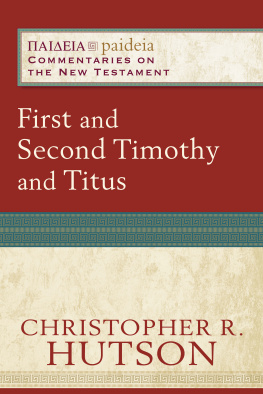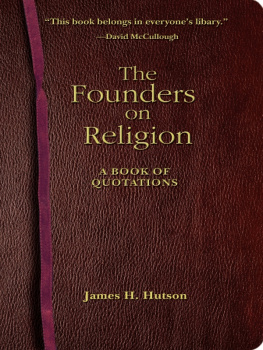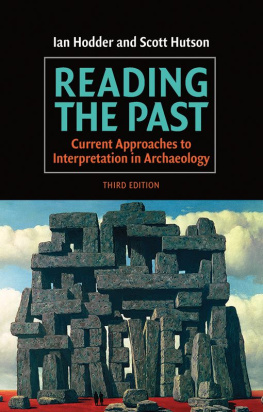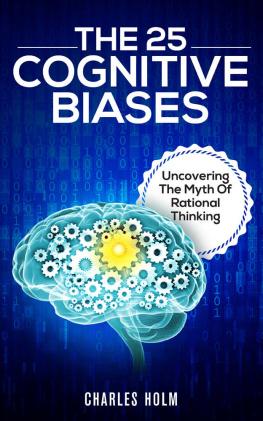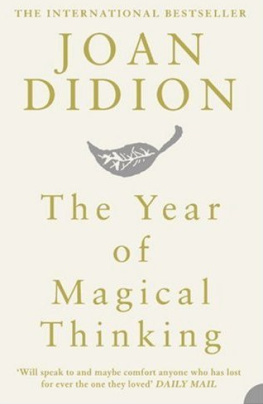Praise for THE 7 LAWS OF MAGICAL THINKING

In this wickedly funny and deeply clever book, Matthew Hutson makes a radical claim: All of us, whether we accept it or not, believe in magic. Without these intuitions, he says, we would hardly be human. Through vivid examples and cutting-edge science, Hutson presents a provocative new theory of how we make sense of the world.
Paul Bloom, Professor of Psychology, Yale University, and author of How Pleasure Works
This book about thinking is magical. Its the perfect blend of astonishing stories, up-to-date science, awe, beauty, disgust, and humour. Its science journalism at its best: great writing and deep humanity bring out the profound relevance of psychological experiments for people who search for meaning using minds that were designed for so many other purposes.
Jonathan Haidt, author of The Happiness Hypothesis
This is a book that you pick up, but cant put down. Hutson, intelligently and entertainingly, gives us the best kind of book, one that gives us insight to our very core.
Ori Brafman, co-author of Sway and Click
Brilliant, exhilarating... Reading this book will lead you to a more reverential appreciation of human irrationality, and the science that tries to understand it.
Dacher Keltner, Director, Greater Good Science Center, University of California, Berkeley
A remarkably creative synthesis of the science behind magical thinking threaded through with a very personal narrative that engages the reader.
Bruce Hood, School of Experimental Psychology, University of Bristol, and author of SuperSense and The Self Illusion
ABOUT THE AUTHOR
Matthew Hutson is a science writer and the former news editor of the magazine Psychology Today. His work has appeared in the New York Times Magazine, Wired, Scientific American Mind, Discover, and many others. He is an atheist and magical thinker.

A Oneworld Book
First published in Great Britain and the Commonwealth
by Oneworld Publications 2012
Published by arrangement with Hudson Street Press,
a member of Penguin Group (USA), Inc
Copyright Matthew Hutson 2012
All rights reserved
The moral right of Matthew Hutson to be identified as the Author of this work has been asserted by him in accordance with the Copyright, Designs and Patents Act 1988
Copyright under Berne Convention
A CIP record for this title is available
from the British Library
ISBN: 978-1-85168-934-7
Ebook ISBN: 978-1-78074-109-3
Cover design by Dan Mogford
Oneworld Publications
185 Banbury Road
Oxford, OX2 7AR
England
Stay up to date with the latest books,
special offers, and exclusive content from
Oneworld with our monthly newsletter
Sign up on our website
www.oneworld-publications.com
For my teachers past, present, and future
Introduction
Were All Believers
I n 2008, the leaders of a powerful clan presided over a ceremony on the grounds of their new house of worship. The clans warriors, known for their fickleness and inconsistency their success against other tribes depending to a large degree on luck worried that an adversary had placed a curse on their home turf. Someone had hidden a significant artefact a symbol of their sworn enemy under the premises. The media, typically dismissive of voodoo, had a field day with this little rite. As journalists looked on, two men friendly to the warriors pulled the offending relic from the ground and raised it high. Flashbulbs illuminated a ragged piece of cloth clearly reading the number 34 and the name Ortiz. The new Yankee Stadium had been cleansed.
Why should an enlightened society adhering to the rigours of science care so much about a shirt buried in concrete? And why would the president of the New York Yankees baseball team threaten the offender with legal action and demand recompense for the cost of replacing the concrete? The jersey carrying the number and name of David Ortiz, the top home-run hitter for the rival Boston Red Sox itself posed no structural threat to the stadium. So how could that worker force the Yankees to dig it up? Because magical powers were attributed to that jersey. (Well revisit Yankee Stadium in chapter 2.)
Most of the world is religious, and millions more are openly superstitious, spiritual, or credulous of the paranormal. But in this book I argue that we all believe in magic luck, mind over matter, destiny, jinxes, life after death, evil, and heavenly helpers even when we are sure we dont.
Magical thinking can be quite banal. We find occult meaning in the world all around us, every day. Do you own any sentimental objects say, a wedding ring, a family heirloom, or an autographed football shirt? Objects youd value more than an identical duplicate? Thats magical thinking. Do you feel that what goes around comes around, through some universal principle of fairness? Thats magical thinking. Do you shout at your laptop when it erases your files? Magical thinking. Do you hope to leave a legacy after you die? Magical thinking. Do you believe that certain events were meant to happen? Magical thinking. Or that you can lift your arm through the power of your conscious thoughts? Magical thinking, even that.
As you will see, those examples all derive from our ongoing flirtation with supernaturalism, a relationship we depend on for our very survival.
Giving Up the Ghost
For the first ten years of my life I went to church every week with my family. Not by choice; I found it boring and hated getting up early and wearing uncomfortable clothes. But we got doughnuts in Sunday school, I enjoyed a modest version of stardom as a member of the choir, and I was allowed to spend sermons drawing tanks and fighter planes blowing up the illustration of the church on the cover of the programme.
And I did believe in, and fear, God. I hated being alone with him in the empty chapel it gave me goose pimples. For a time I refused to say the word God and would spell it out. I even wrote it G-O-D.
But things changed when I was about ten years old, when I discovered a copy of A Brief History of Time by Stephen Hawking on my parents bedroom floor. I read his portrayal of the evolution of the universe, first with my father and then on my own, and saw that the Big Questions could be answered, or at least approached, by science. God made less and less sense.
I found more books on the big bang and the fabric of space-time and abandoned my belief in a personal creator but not my obsession with him. I became a strident young atheist, eager to debate anyone who stooped to have faith in an invisible guide. In the copy of Why I Am Not a Christian by the philosopher Bertrand Russell that I purchased for pleasure-reading when I was about twelve, I underlined passages such as, It would seem, therefore, that the three human impulses embodied in religion are fear, conceit, and hatred. I struggled to understand humanitys unshakeable hold on magical beliefs its stock in miracles, gods, a soul against all reason.
Thats just it: faith is unreasonable, an emotional reaction. But shouldnt reason triumph in deciphering the workings of the universe? Why cry out for a daddy in the sky to explain things and keep you safe? (I have Freudian interpretations of my conversion, too, but Ill save those for psychotherapy.) In my Vulcan mind-set, I looked down on the religious as stupid or weak or both.
Next page


